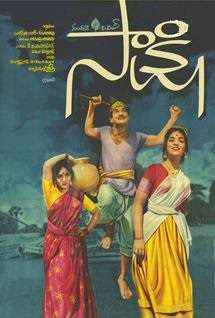Sakshi (1967 film)
| Saakshi | |
|---|---|
 Poster | |
| Directed by | Bapu |
| Produced by | Seshagiri Rao |
| Written by | Mullapudi Venkata Ramana |
| Starring |
Krishna Vijaya Nirmala Sakshi Ranga Rao Rajababu Vijayalalitha Chalapathi Rao |
| Music by | K. V. Mahadevan |
| Cinematography | P. N. Selvaraj |
Release date | 1967 |
Running time | 172 min. |
| Country | India |
| Language | Telugu |
Saakshi (Telugu: సాక్షి) is a 1967 Telugu film. It was the first film made by the writer-director duo of Mullapudi Venkata Ramana and Bapu. The film won critical acclaim at the Tashkent film festival in 1968.[1]
The movie introduced Krishna in a leading role, who would go on to become a major player in Telugu. Vijaya Nirmala was cast beside him, who would later marry Krishna. The movie was both a critical and financial success.
Also introduced in the movie was Saakshi Ranga Rao, whose name was preceded by the movie's title in every other movie he acted in subsequently. The movie tells the story of a naive and bucolic young man who is exploited by society and turns into a hard-hearted person. The movie was marked by great performances from Krishna, Vijaya Nirmala and 'Sakshi' Ranga Rao and would stand as a milestone in their long careers.
Soundtrack
There are five songs in the film.[2] Four of them including Radha Madhavam (Yakshaganam) are written by Arudra.[3]
- "Amma Kadupu Challaga Atta Kadupu Challaga Batakara" (Lyrics: Arudra; Singer: P. Susheela)
- "Evariki Vaare Eelokam Raaru Evvaru Neekosam" (Lyrics: Arudra; Singer: Mohan Raju)
- "Orandagada Bangaru Saami Naa Manasu Evaripalu Chetunura" (Lyrics: Arudra; Singer: P. Susheela)
- "Radha Madhavam" (Yakshaganam) (Lyrics: Arudra; Singers: P. B. Srinivas, P. Susheela and group)
- "Silipoda Sinnoda Cheera Dochukunnoda" (Singers: Ghantasala and P. Susheela)
References
- ↑ http://www.hindu.com/mp/2011/03/05/stories/2011030552160400.htm
- ↑ http://ghantasalagalamrutamu.blogspot.com/
- ↑ Saakshi, Arudra Cine Geethalu (1965-1970), compiled by K. Ramalakshmi, Vishalandhra Publishing House, Hyderabad, 2002, pp: 60-63.
External links